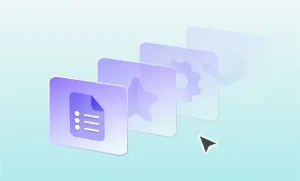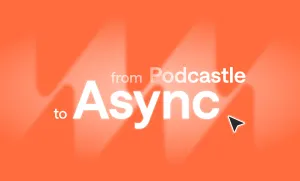Being a digital content creator has tons of benefits. You can work from anywhere. You can focus on your passion. And you have access to multiple revenue streams.
Rather than being solely reliant on views for income, content creators can earn money from brand endorsements, deals with media companies, and their own businesses.
But what happens when they strike deals with less-than-legit brands or partner with businesses that end up hindering their growth?
In this article, we’re breaking down some of the worst deals struck in creator history and looking at what you can do to avoid the same fate.
Three creator slip-ups you can learn from
From poorly thought-out production partnerships to dodgy brand deals, there are countless cautionary tales out there. Let’s look at three mishaps you can learn from.
1) Andrew Callaghan & All Gas No Breaks
The moral of this story is, ‘Always read your contract, kids.’
Here’s what happened: After journalist Andrew Callaghan pitched the idea for a video-based road show inspired by his book All Gas No Brakes to a production company called Doing Things Media, he was offered an employment contract. And he signed it — without reading it.
21-year-old Callaghan was so excited by the opportunity that he didn’t realize he’d signed away the intellectual property rights to the All Gas No Brakes brand, including his image, story, and content ideas, to Doing Things Media.
While he’d receive a yearly salary, access to funding and resources, and a percentage of the show’s Patreon income, he didn’t actually own the All Gas No Brakes YouTube channel or have full creative control over the content he was contracted to produce.
The partnership worked well for a period, but trouble started brewing when Doing Things Media began pressuring Callaghan, who wanted to produce independent journalism, to “make the show less political.” Feeling creatively collared, Callaghan asked to negotiate his contract, leading to his team being kicked out of the brand’s social media profiles. They were later fired.
Callaghan has since launched his own channel, Channel 5 with Andrew Callaghan, but has learned a big lesson about signing away your intellectual property and the importance of reading every contract.
2) Gabby Hanna and Kenza Cosmetics
Influencer partnerships only work because their audience trusts them. But what happens when a creator betrays this trust by promoting what viewers accuse of being a ‘scam’?
Just ask Gabby Hanna.
So, what happened? Back in 2019, Hanna took to her platform to promote Kenza Cosmetics’s limited-time offer to get $80 worth of makeup brushes for just the small price of the $9.99 shipping.
Sounds too good to be true, right? That’s because it was. Not only did customers’ orders take months but the brushes were awful. After doing some digging, Hanna’s followers discovered that Kenza was a dropshipping company and sourced its products from AliExpress, and called her out for promoting the ‘scam'. '
In an ill-thought-out response, Hanna lashed out at critics, saying that they should “manage their expectations,” as if she hadn’t given the product a glowing review in her ad. This comment went down exactly as you’d expect — like a lead balloon.
While Hanna later apologized for not vetting the company before endorsing it, the damage to her reputation had already been done.
3) Floyd Mayweather, DJ Khaled, and Centra Tech
Oh, where do we start with this one? As we’ve seen, bad brand deals can destroy a creator’s reputation, but failing to vet your partners can have much more serious ramifications, including landing you in legal trouble.
In 2018, Floyd Mayweather Jr. and DJ Khaled capitalized on the rising crypto trend by signing endorsement deals with Centra Tech, an alleged illegal cryptocurrency scam.
Despite presumably having PR teams managing their brands, they didn’t do enough research into the business’s operations, and later in the year, its founder was charged with fraud.
What happened next highlighted the importance of transparency and meeting legal obligations, especially when promoting financial products. Not only were the two ‘influencers’ charged with failing to disclose payments they received for promoting Centra Tech on their social platforms, but they were also sued by the investors who had backed Centra Tech based on their endorsements. Whoops!
Red flags and green lights: how to avoid scandal
The lesson here isn’t to avoid partnerships. They can be hugely beneficial for creators like you — when you choose them well. Instead, follow these tips to make sure your partnerships are ticking all the right boxes:
- – Research the brand. Research the company’s background, looking for previous scandals and a history of poor product reviews.
- – Maintain authenticity. Choose products, brands, and partners that align with your values, and make sure to test them for quality before promoting them to your audience. If you’re not sure you can handle all the research and extra work that comes with it, we suggest looking at the remote content moderator jobs on online job platforms and hiring a content manager to guide you through the process and help you select the best brand deals.
- – Put your audience first. It’s all too easy to take the money and run without thinking too deeply about what you’re promoting. But you have a responsibility to your audience, and should listen to their feedback.
- – Be transparent. This one is simple: always follow FTC advertising guidelines for brand deals by clearly disclosing paid sponsorships.
- – Read your contract. When signing with an agency or production company, make sure you’re clear on your responsibilities and what value you’re giving away.
- – Watch out for red flags. If the business promises benefits they can’t provide evidence for, has a history of poor customer service, is unprofessional, or lacks transparency, walk away. The money isn’t worth the risk of tanking your reputation.
Hear from other content creators
Did you enjoy these tips and content creator stories? If so, join our Discord community! It's full of other passionate content creators sharing tips, advice, and stories to keep you informed and in the loop of the latest trends.








